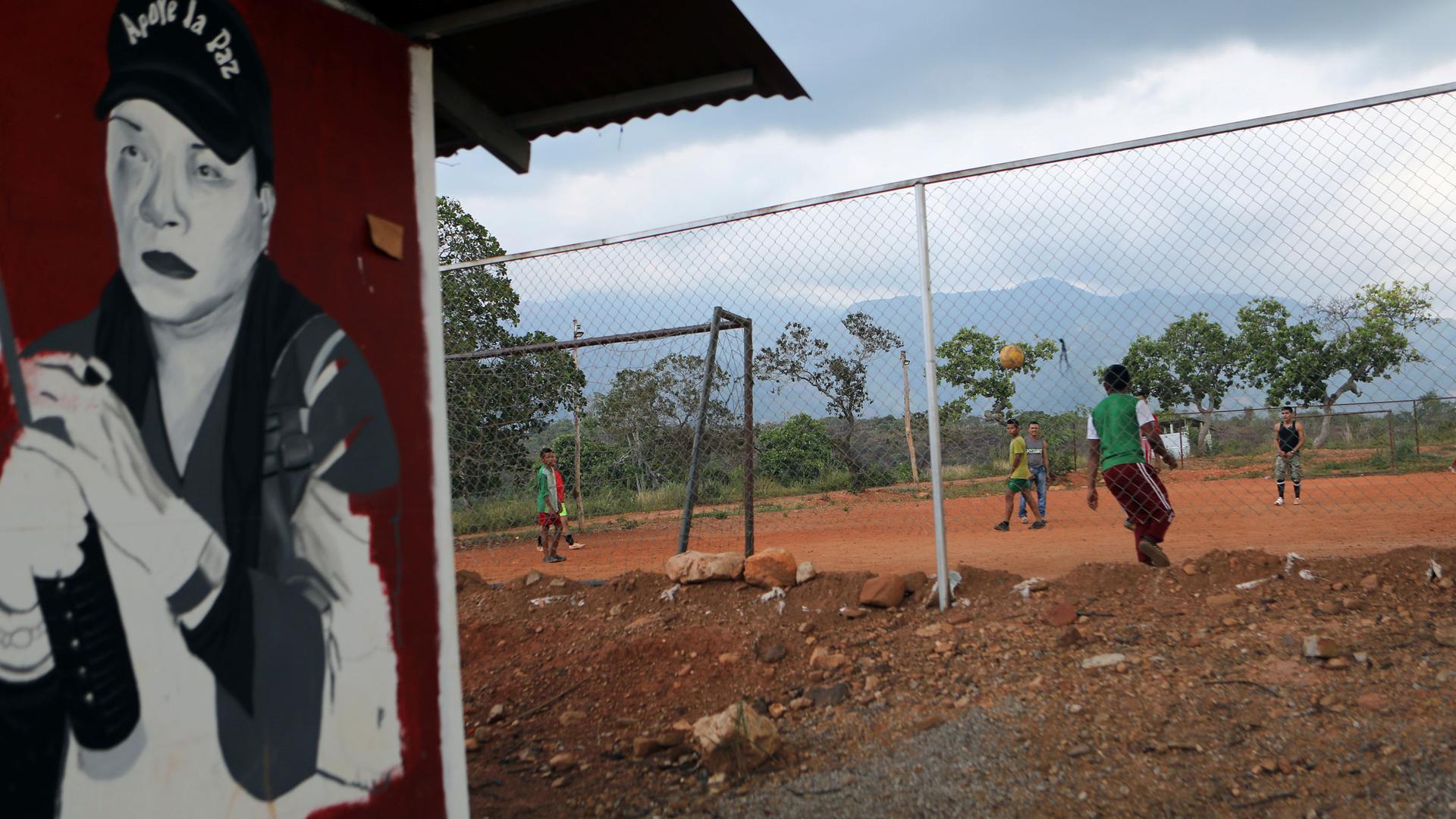In lead-up to Colombian elections, woman mayoral candidate is latest assassination victim
Former rebels of the Revolutionary Armed Forces of Colombia (FARC), play football at a reintegration camp in Tierra Grata, Colombia, on Aug. 3, 2019.
Karina García had made it clear she was worried people would come for her.
The 32-year-old mayoral candidate from the state of Cauca, Colombia, said she had received threats during her campaign and asked for help from the authorities — warning that she could face “fatal consequences.”
But by Sunday, Sept. 1, help had come too late. While returning to her rural town of Suarez following a day of campaigning to be the first female mayor in the area, the car she was traveling in with six others — including her mother — was shot at before being set on fire. Six people were killed in the attack, which reportedly involved a grenade. The driver managed to escape and survived. García, a lawyer, leaves behind a 3-year-old son and husband.
García is the sixth mayoral candidate to be assassinated in the year leading up to Colombia’s local and regional elections to be held on Oct. 27. Five city council candidates have also been murdered, according to Colombia’s independent electoral observers, who monitor elections. These types of attacks have increased in disputed areas such as Cauca, where the FARC’s departure has left behind a power vacuum. The rebels’ announcement in August that they would be willing to take up arms again against the government — shaking the already precarious peace deal that ended 52 years of war and saw most of the 7,000 members of the illegal armed group put down their weapons — might exacerbate the violence, experts say.
Related: Despite the peace deal, former FARC fighters face a new war in rural Colombia
It is not wholly clear who targeted García and the group she was with — which also included three local activists and a candidate for the municipal council — but the government was quick to put the blame on FARC dissident groups who rejected Colombia’s historic 2016 peace deal.
The leader of the FARC dissident group in that area, Mayimbú, has since reportedly put out pamphlets saying he was not behind the attack.
A source close to the peace process also told The World it was “highly unlikely” it was a dissident member of the FARC.
But García’s hometown of Suarez and the wider southwestern department of Cauca offers a case study of Colombia’s failing peace deal.
Rural with fertile ground for growing coca, the base ingredient of cocaine, Cauca is the perfect base for illegal armed groups who want a cut in the narcotics trade. An extremely lucrative area now no longer occupied by the FARC, the state of Cauca is for the taking. Activists, politicians and ordinary citizens are particularly at risk. A climate of fear reigns, especially with local elections just around the corner, according to Rossi Muñoz, Cauca’s ombudsman, who oversees the protection of civil and human rights.
Related: Colombia’s peace process under stress: 6 essential reads
“Armed groups put pressure on the candidates who oppose trades within their territory such as illicit crops cultivation, drug trafficking and illegal mining,” said Muñoz. “Many candidates — mayors, governors, councilors — have opposed these trades within their territory and this has created a climate of fear within the communities as we see violent actions like these.”
Since the peace deal, 486 people, including activists and community leaders, have been killed, according to the ombudsman.
Now, in the run-up to the country’s local elections to be held on Oct. 27, political candidates deemed unfavorable to the armed groups are being targeted too.
“Right now, a local civil society leader is killed every 2 and 1/2 days in Colombia,” said Adam Isacson, a senior analyst at the Washington Office on Latin America, a DC-based think tank. “A former FARC member is killed every 7 and 1/2 days. As Colombia’s local election campaign heats up, violence against electoral candidates is expected to follow this trend.”
Politicans, even at the mayoral level, have a lot of power, he explained.
“Mayors and governors control budgets and lucrative contracts. They command police and determine local security priorities. Criminal groups vying for control of cocaine transshipment or illegal mining want to ensure that local officials favor them, and not their rivals,” he added.
Related: 9 Colombian rebel dissidents killed in bombing raid, president says
While recent elections in Colombia have been some of the most nonviolent in Colombian history, said Gimena Sánchez, WOLA’s director for the Andes, the Suarez killings are going to lead to “more violence than prior years.”
The day after the attack, citizens in the small town of Suarez gathered to pay tribute by lighting candles in a memorial ceremony. Tributes flooded social media. Members of the victims’ families have left the town this week.
And as the local elections approach, those living in disputed areas throughout Colombia will continue to live on the edge — especially candidates who have a political agenda contrary to the armed groups.
“It is going to be a very tense two months [up until the elections], especially in rural areas that are strategic for drugs and other illicit business,” Isacson said.
We’d love to hear your thoughts on The World. Please take our 5-min. survey.
